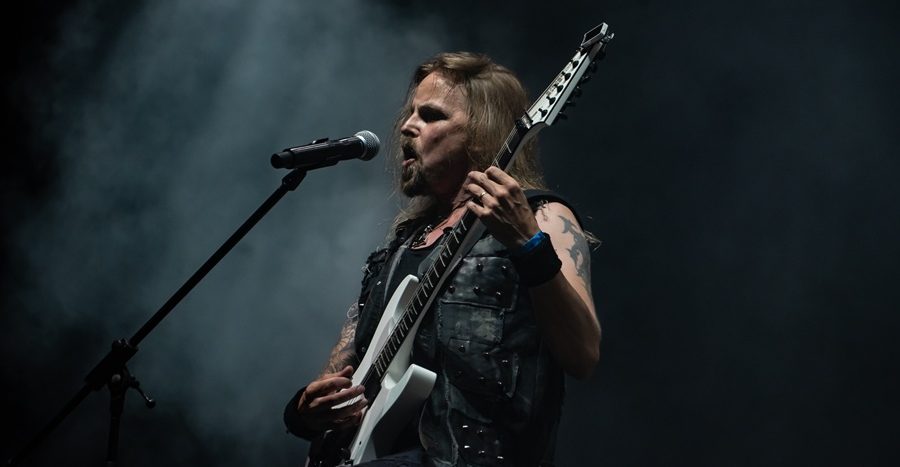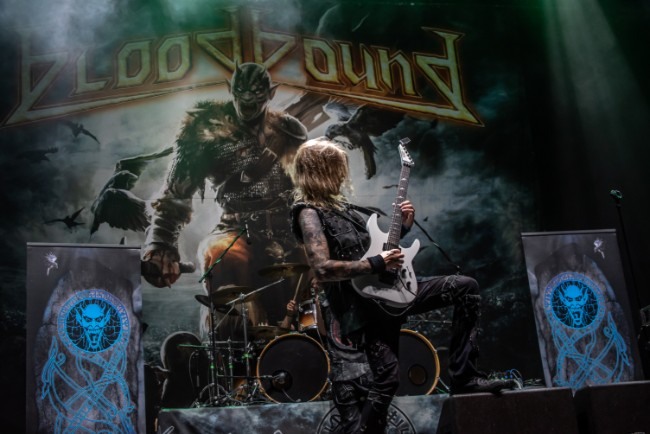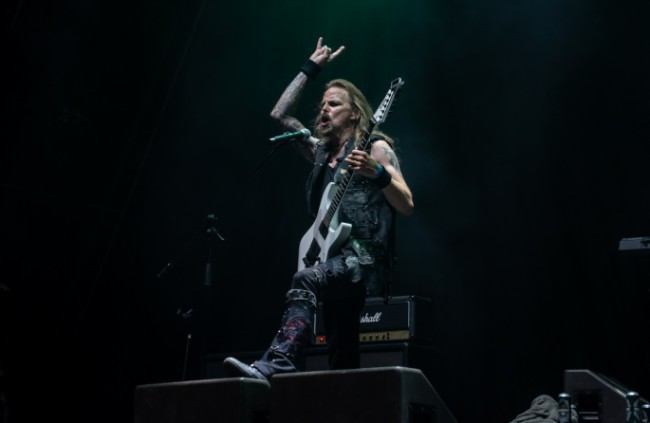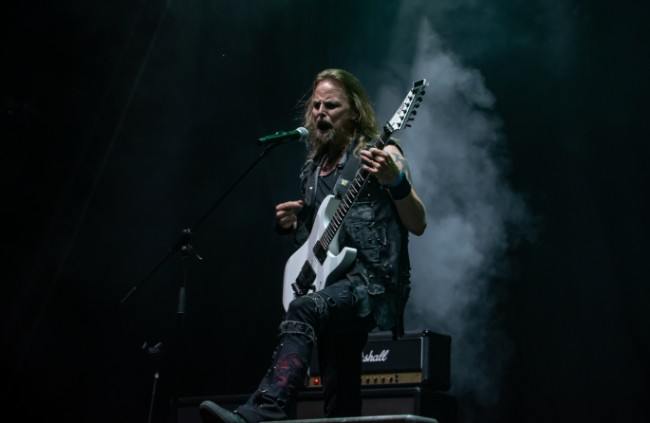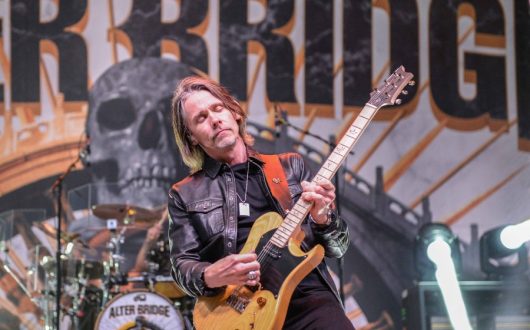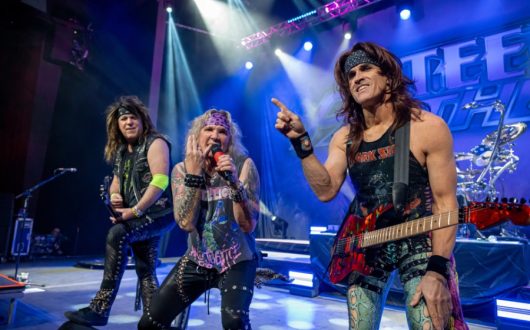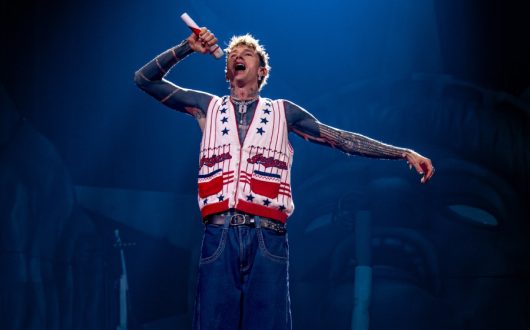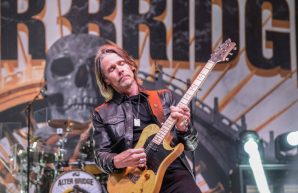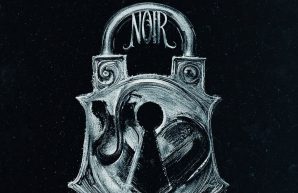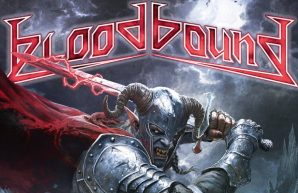Interview by Adrian Hextall
As the Swedish power metal titans prepare to unleash Field of Swords this Friday under a new banner, founder Tomas Olsson reflects on two decades of survival, the shift from Vikings to Crusaders, and why the band is playing faster, harder, and louder than ever before.
The basement studio in Bollnäs, Sweden, is quiet. It is the deceptive calm before a very specific type of storm—a storm characterized by galloping double-kick drums, soaring choruses, and the clash of medieval steel. Tomas Olsson, the founder and lead guitarist of Bloodbound, is sitting in this quiet space, waiting.
On Friday, November 21st, the silence will break. Bloodbound will release their eleventh studio album, Field of Swords, marking a bold new chapter for the band. It is their first release under a new record label—a move that signals not just a change in business partners, but a leveling up of ambition for a band that has quietly become one of the most consistent forces in European power metal.
“I’m just at home waiting for the release,” Olsson says, his voice betraying a mixture of veteran composure and genuine, almost youthful anticipation. “I’m very excited. We’re releasing a third video tomorrow, and then, of course, the release on Friday. It’s everything it’s been building up to.”
For a man who has steered this ship since 2004, Olsson sounds remarkably fresh. In an industry where bands from the early-2000s power metal explosion have largely faded into obscurity or nostalgia acts, Bloodbound is doing the opposite: they are getting bigger, faster, and more conceptually dense.
To understand Field of Swords, one must understand the trajectory of Bloodbound. When Olsson and keyboardist Fredrik Bergh formed the band over twenty years ago, the landscape was different. Melodic death metal was the flavor of the month in Sweden, but Olsson had his eyes on the classics.
“When we started out, we were more like a traditional heavy metal band that liked fast songs,” Olsson reflects. “It was more about the dark side, the intriguing stuff. We loved Iron Maiden with their Eddie, Judas Priest… that was the tone of the early albums.”
But Bloodbound has never been a band to stand still. Over the last decade, they have morphed from the occult themes of Nosferatu into high fantasy with Stormborn, and then into the rugged, historical landscapes of the Viking Age with Tales from the North. Now, they are marching forward again.
“We did three albums on the dragon theme, then evolved into the Viking era,” Olsson explains. “It wasn’t a plan to continue historically, but I had an idea that we should write about the importance of iron—how forging iron affected human evolution.”
This fascination with metallurgy led Olsson down a rabbit hole that ended in the Holy Land. “When I read about it, I got more into the knights and the Crusader era. That’s when the swords became better, the armor became stronger. The last song on Tales from the North is ‘1066,’ about the Battle of Stamford Bridge where the Viking era ended. The First Crusade started in 1096. It’s only thirty years apart. It felt natural to continue this historical journey.”
While the lyrical content looks back to the bloody conflicts of the 12th century, the sonic architecture of Field of Swords is aggressively modern. Olsson and Bergh were not content to rest on the “polished” laurels of their previous successes. They wanted grit. They wanted edges.
“Fredrik mentioned this has a slightly more modern sound,” Olsson notes. “We have a new producer and mixing guy. The guitars and drums are a little more ‘in your face,’ a little sharper. In earlier albums, we had a very polished sound—sometimes almost overproduced. This time, we wanted it to cut through.”
“We wanted to kick it up a little bit,” Olsson says. “We felt a few albums in the past were more mid-tempo. When you play faster, you write in a slightly different way.”
This ambition presented physical challenges in the studio. Olsson describes the grueling process of recording “Forged in Iron,” a track where drummer Daniel Sjögren pushes the double bass to a blistering 210 BPM. For Olsson, laying down the rhythm guitars required surgical precision.
“You have to do four different tracks, exactly the same, super tight to get that crunch,” he reveals, pulling back the curtain on the band’s massive wall of sound. “If it’s a difficult part, you need to do it over and over again. You mix different amps—two guitars with one amp, two with another—and blend them. If you listen on headphones, especially the last thirty seconds of ‘Forged in Iron,’ that is a challenge. But Daniel is a very good drummer when it comes to playing fast.”
The album’s lead single, “Defenders of Jerusalem,” serves as the perfect microcosm of this new era. Written by Olsson, the track is a stomping, cinematic anthem that draws direct inspiration from Ridley Scott’s 2005 epic Kingdom of Heaven.
“It’s one of my favorite movies,” Olsson says. “The siege of Jerusalem in 1187… it’s just a good story. I had the riffs, something close to the vibe of ‘Rise of the Dragon Empire,’ and I felt we could do something epic.”
However, releasing a song with “Jerusalem” in the title in the current geopolitical climate was not a decision the band took lightly. Olsson admits to a moment of hesitation when real-world events began to mirror the chaos of his historical lyrics.
“I had the words before all this happened in the news with the war in Gaza,” he says solemnly. “When the release for the single was coming up, we realized, ‘Shit, this can be seen as political.’ We actually thought about changing it. But we decided, as long as we make it clear that it is about history, we proceed.”
The resulting video leaves no room for ambiguity, opening with a title card for the year 1187 and featuring the band performing in a genuine 13th-century church—a location that required special permits to film in. “It’s a museum now, basically,” Olsson laughs. “But it turned out really cool.”
As Field of Swords hits streaming services and shelves this Friday, it serves as a monument to Bloodbound’s endurance. In a genre where lineups are often revolving doors, the core of the band has remained remarkably stable. Vocalist Patrik J. Selleby has been the “new guy” for fifteen years, and the rhythm section has locked in to become a formidable machine.
When asked to define the secret to their rising success—the better festival slots, the signing to a major new label, the bigger tours—Olsson points to a lack of ego and a surplus of discipline.
“It’s been a struggle, but a fun struggle,” he says. “We knew from the start in 2004 that power metal wasn’t the popular genre. We just wanted to do it with high quality. We have a structured way to work. We don’t tour enough to get tired of each other. We still have fun.”
Looking back on twenty years, Olsson pauses when asked for a highlight. He doesn’t choose the studio, or a record deal signing. He chooses the communion with the fans. He takes us back to the Masters of Rock festival in the Czech Republic, where Bloodbound was given the daunting late-night slot, following legends like Helloween.
“We were standing tuning our guitars backstage, listening to Kai Hansen singing ‘Future World,’ and we felt like, ‘Hush, everybody is going to leave now,'” Olsson recalls. “But they stayed. I remember a guy in the front row with a big Swedish flag. He had written on it, ‘Can I believe what I saw in the night?’—a lyric from our ‘Nosferatu’ song. He was singing along to everything. That was a special feeling.”
There is a specific joy that comes with being a songwriter, a joy that Olsson cherishes above all else. It is the moment when the files are closed, the mixing desk is turned off, and the physical product arrives in the mail.
“It’s very satisfying,” he says. “You get a bit of distance because you haven’t listened to it for a while. You hold the album in your hands, and you listen back. It puts you in the space of the fan.”
This Friday, fans around the world will join Olsson in that space. They will hear the collaboration with Brittney Slayes of Unleash The Archers on “The Nine Crusades” (featuring a clever lyrical nod to her band: ‘The archers prepare to engage’). They will hear the thunder of Daniel Sjögren’s drums. They will hear the sharp, modern bite of Olsson’s guitars.
Bloodbound has survived the trends, survived the industry shifts, and survived the passage of time. They have traded their dragon scales for chainmail, but the spirit remains the same. They are the defenders of a sound that refuses to die.
“It’s a crazy journey,” Olsson concludes, ready to sign off and prepare for release day. “But we’re still here.”
Bloodbound’s new album, Field of Swords, is out now (Friday, November 21st, 2025) via Napalm Records.
https://label.napalmrecords.com/bloodbound
Our review is here:
